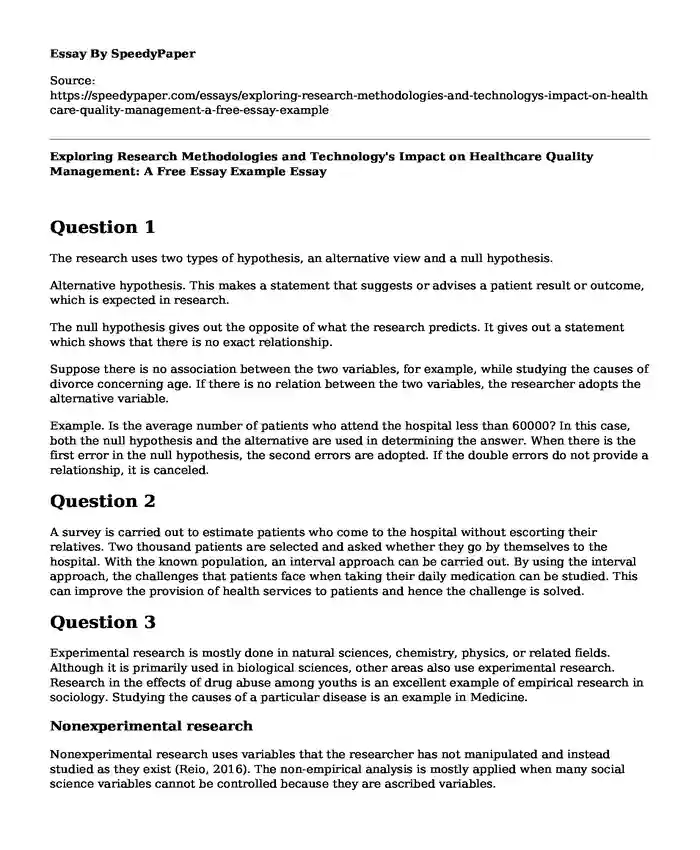
| Type of paper: | Essay |
| Categories: | Management Health and Social Care Technology |
| Pages: | 3 |
| Wordcount: | 645 words |
Question 1
The research uses two types of hypothesis, an alternative view and a null hypothesis.
Alternative hypothesis. This makes a statement that suggests or advises a patient result or outcome, which is expected in research.
The null hypothesis gives out the opposite of what the research predicts. It gives out a statement which shows that there is no exact relationship.
Suppose there is no association between the two variables, for example, while studying the causes of divorce concerning age. If there is no relation between the two variables, the researcher adopts the alternative variable.
Example. Is the average number of patients who attend the hospital less than 60000? In this case, both the null hypothesis and the alternative are used in determining the answer. When there is the first error in the null hypothesis, the second errors are adopted. If the double errors do not provide a relationship, it is canceled.
Question 2
A survey is carried out to estimate patients who come to the hospital without escorting their relatives. Two thousand patients are selected and asked whether they go by themselves to the hospital. With the known population, an interval approach can be carried out. By using the interval approach, the challenges that patients face when taking their daily medication can be studied. This can improve the provision of health services to patients and hence the challenge is solved.
Question 3
Experimental research is mostly done in natural sciences, chemistry, physics, or related fields. Although it is primarily used in biological sciences, other areas also use experimental research. Research in the effects of drug abuse among youths is an excellent example of empirical research in sociology. Studying the causes of a particular disease is an example in Medicine.
Nonexperimental research
Nonexperimental research uses variables that the researcher has not manipulated and instead studied as they exist (Reio, 2016). The non-empirical analysis is mostly applied when many social science variables cannot be controlled because they are ascribed variables.
An excellent example of nonexperimental research is one which was carried out for an extended period. A study was conducted to examine the association between psychometric intelligence at the age of 11 and educational achievement in national examinations in 25 academic subjects. The survey carried out to determine if psychometric intelligence affects students education (Deary et al.,2007)
Quasi-experimental research
A quasi-experiment is used when researchers want to test causal relationships in many situations where the design is complicated.
Question 4
Qualitative improvement in activities that are used urgently in improving the health care of patient care. Simultaneously, research is an investigation used to contribute to general knowledge and is not used for urgent change. A good example of qualitative improvement is when there is an action of medical cost to improve patient outcome—studying if it is true that there is a correlation between patient and their relatives who escort them. This increases general knowledge in the field.
Question 5
Epidemiology data measures controls and prevention programs (Robertson, 2020). It helps in the generation of hypotheses in etiology, exposure mode, and control measures. Epidemiology improves healthcare quality management. Epidemiological data are used in continuous planning, control, and improvement of health care.
Question 6
Technology has evolved compared to the early years. My organization uses an electrical health record system. This is the storage of the medical information of patients. Patients' data are collected and stored in the system—this or events loss of patient's data compared to paperwork storage. Patients can also get their medical data at any hospital they visit; their data is then transferred electrically. It improves the medical health of the patient.
Reference
Deary, I. J., Strand, S., Smith, P., & Fernandes, C. (2007). Intelligence and educational achievement. Intelligence, 35(1), 13-21.
Reio, T. G. (2016). Nonexperimental Research: Strengths, weaknesses, and issues of precision. European Journal of Training and Development.
Robertson, I. D. (2020). Disease control, prevention, and on-farm biosecurity: the role of veterinary epidemiology. Engineering, 6(1), 20-25.
Cite this page
Exploring Research Methodologies and Technology's Impact on Healthcare Quality Management: A Free Essay Example. (2024, Jan 18). Retrieved from https://speedypaper.com/essays/exploring-research-methodologies-and-technologys-impact-on-healthcare-quality-management-a-free-essay-example
Request Removal
If you are the original author of this essay and no longer wish to have it published on the SpeedyPaper website, please click below to request its removal:
- Free Essay on Intensive Care Unit Monitoring System
- Essay Example on Abortion: Should A Woman Get an Abortion for Any Reason
- The Case of the Wondering Eyes - Free Essay on Medical Ethics
- Free Essay Example about Recent Innovation
- Free Essay. Implications of the Social Determinants of Health
- Essay Sample on Human Diseases by System: Skeletal and Muscular
- Paper Sample on Assessing 30 Years of Meteorological and Drought Trends in Northern Thailand: Implications and Analysis
Popular categories




